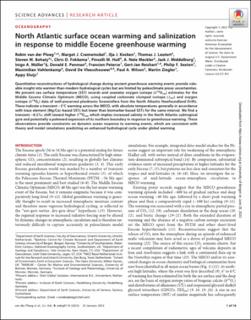North Atlantic surface ocean warming and salinization in response to middle Eocene greenhouse warming
van der Ploeg, Robin; Cramwinckel, Margot J.; Kocken, Ilja J.; Leutert, Thomas Jan; Bohaty, Steven M.; Fokkema, Chris D.; Hull, Pincelli M.; Meckler, Anna Nele; Middelburg, Jack J.; Müller, Inigo A.; Penman, Donald E.; Peterse, Francien; Reichart, Gert-Jan; Sexton, Philip F.; Vahlenkamp, Maximilian; De Vleeschouwer, David; Wilson, Paul A.; Ziegler, Martin; Sluijs, Appy
Journal article, Peer reviewed
Published version

Åpne
Permanent lenke
https://hdl.handle.net/11250/3074327Utgivelsesdato
2023Metadata
Vis full innførselSamlinger
- Department of Earth Science [1050]
- Registrations from Cristin [9791]
Sammendrag
Quantitative reconstructions of hydrological change during ancient greenhouse warming events provide valuable insight into warmer-than-modern hydrological cycles but are limited by paleoclimate proxy uncertainties. We present sea surface temperature (SST) records and seawater oxygen isotope (δ18Osw) estimates for the Middle Eocene Climatic Optimum (MECO), using coupled carbonate clumped isotope (Δ47) and oxygen isotope (δ18Oc) data of well-preserved planktonic foraminifera from the North Atlantic Newfoundland Drifts. These indicate a transient ~3°C warming across the MECO, with absolute temperatures generally in accordance with trace element (Mg/Ca)–based SSTs but lower than biomarker-based SSTs for the same interval. We find a transient ~0.5‰ shift toward higher δ18Osw, which implies increased salinity in the North Atlantic subtropical gyre and potentially a poleward expansion of its northern boundary in response to greenhouse warming. These observations provide constraints on dynamic ocean response to warming events, which are consistent with theory and model simulations predicting an enhanced hydrological cycle under global warming.
